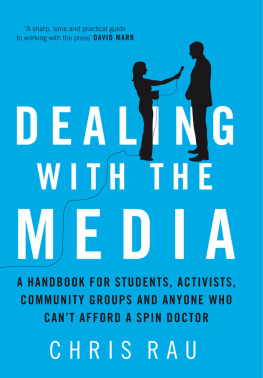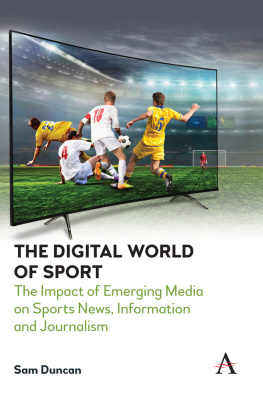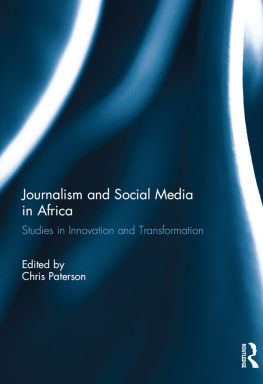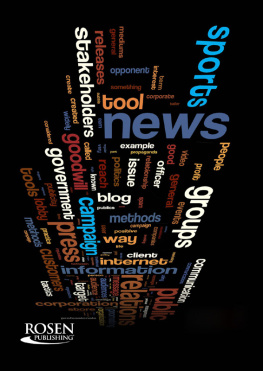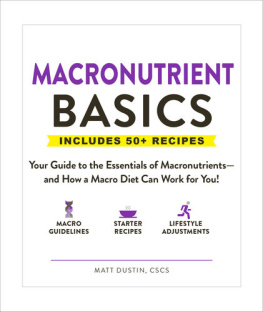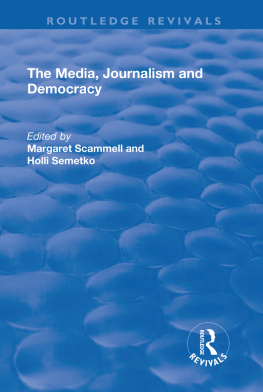Chris Rau - Dealing with the Media
Here you can read online Chris Rau - Dealing with the Media full text of the book (entire story) in english for free. Download pdf and epub, get meaning, cover and reviews about this ebook. year: 2010, publisher: University of New South Wales Press, genre: Home and family. Description of the work, (preface) as well as reviews are available. Best literature library LitArk.com created for fans of good reading and offers a wide selection of genres:
Romance novel
Science fiction
Adventure
Detective
Science
History
Home and family
Prose
Art
Politics
Computer
Non-fiction
Religion
Business
Children
Humor
Choose a favorite category and find really read worthwhile books. Enjoy immersion in the world of imagination, feel the emotions of the characters or learn something new for yourself, make an fascinating discovery.
- Book:Dealing with the Media
- Author:
- Publisher:University of New South Wales Press
- Genre:
- Year:2010
- Rating:4 / 5
- Favourites:Add to favourites
- Your mark:
- 80
- 1
- 2
- 3
- 4
- 5
Dealing with the Media: summary, description and annotation
We offer to read an annotation, description, summary or preface (depends on what the author of the book "Dealing with the Media" wrote himself). If you haven't found the necessary information about the book — write in the comments, we will try to find it.
Dealing with the Media — read online for free the complete book (whole text) full work
Below is the text of the book, divided by pages. System saving the place of the last page read, allows you to conveniently read the book "Dealing with the Media" online for free, without having to search again every time where you left off. Put a bookmark, and you can go to the page where you finished reading at any time.
Font size:
Interval:
Bookmark:
C HRIS R AU is a freelance journalist who has written for The Sydney Morning Herald , Australian Doctor and Living Ethics and was listed on The Australian Financial Review Magazine s annual cultural power list for 2005. She has also worked on the National Times , Melbourne Herald , The Age and Sun Herald newspapers. Her fields of expertise include law, crime, social justice issues and health and medico-legal issues.
Chris is the sister of Cornelia Rau and helped expose her sisters wrongful incarceration at South Australias Baxter Detention Centre, which ultimately influenced the Palmer Inquiry into mandatory detention and the governments stance on mental health issues. Rau spent a year writing stories about Cornelias case in an attempt to discover the truth behind her sisters incarceration.

A UNSW Press book
Published by
University of New South Wales Press Ltd
University of New South Wales
Sydney NSW 2052
AUSTRALIA
www.unswpress.com.au
Chris Rau 2010
First published 2010
This book is copyright. Apart from any fair dealing for the purpose of private study, research, criticism or review, as permitted under the Copyright Act, no part may be reproduced by any process without written permission. Inquiries should be addressed to the publisher.
National Library of Australia
Cataloguing-in-Publication entry
Author: Rau, Chris.
Title: Dealing with the media: A handbook for students, activists, community groups and anyone who cant afford a spin doctor/by Chris Rau.
ISBN: 978-1-74224-005-3
Subjects: Mass media.
Public relations.
Dewey Number: 302.23
Digital conversion by Pindar NZ

Thanks first of all to the staff at UNSW Press, who transformed a chance encounter into a manuscript, and to Christine Laurence, who commissioned the speech for the Western Suburbs Community Forum in Sydney where this idea was launched in 2006.
The book, initially straightforward, turned into a multi-headed hydra, but weve wrestled with the beast. Thanks to Phillipa McGuinness, Gabriella Sterio and Elspeth Menzies from UNSW Press for steering the creature into calmer waters.
More than thirty contributors and many more interviewees kindly helped with their insights. The old adage of when in doubt, ask a busy person is true. Some of the interviews and contributions unfortunately had to be cut for space reasons, but the information people provided still helped to shape the overall themes of the book. To those contributors, not only thanks but also apologies. All contributors and interviewees were unpaid, and took time out of busy lives because they are committed to their fields. University media lecturers like Charles Sturts Rod McCulloch and Chris McGillion, and Sydney Universitys Dr Anne Dunn helped with statistics for media students, as ephemeral as those statistics are. Their colleagues, CSUs Kay Nankervis and RMITs Maree Curtis and Amanda Crane, also provided valuable insights.
Contributors, interviewees, and those who provided background material include: Phillip Adams, Dr Neil James, Alan Kennedy, Dick Hughes, Brian Toohey, Ross Coulthart, Hugh Mackay, Richard Ackland, Donald Alexander, Mark Day, Eric Beecher, John Hartigan, Andra Jackson, John Highfield, David Marr, Garry Linnell, Bob Osburn, Christopher Zinn, Mike Osborne, Mike Bowers, Peter Rae, Tom Krause, Mark Colvin, Anita Jacoby, Chris Warren, Ngareta Rossell, Jacqueline Everitt, the GetUp! organisation, Richard Jeffkins, Wendy Bacon, George Newhouse, Claire OConnor, Ray Watterson, Michael Atherton, John MacDonald, Paul Wilson, Linda Briskman, Marie Bashir, Robyn Williams, Peter Doherty, Lyndal Byford, Claire ORourke, Wendy Harmer, Jack Smit, Ken Burgin, Cat Kutay and Pamela Hewitt.
Thanks especially to those kind souls who braved a wet Sydney winters day and helped discuss questions from this author at a round-table discussion at the GetUp! office in Surry Hills: Simon Sheikh, Sam McLean and their GetUp! colleagues, TV journalist Chris Castellari, the ABCs Jonathan Holmes, the MEAAs Jonathan Este, Ari Kahn, NewMatildas Rob McGuinness and News Limited online editor David Higgins.
The biggest thanks go to Alexandra, Ross and Callum MacDonald, who tolerated a sleepless and preoccupied Mum during the writing of this book. Callum provided inspiring guitar concerts, Alexandra provided drama worthy of the STC, and Ross provided unspoken support and cuddles.

In 2007, Channel Nines Sunday reporter Ross Coulthart was sniffing out information about mortality and morbidity rates in hospitals. He was hoping to emulate US journalistic scoops using freedom of information laws that allowed him to obtain databases as well as documents. Coulthart was particularly keen to find statistics he knew all hospitals kept, which recorded the death and disease rates for certain key surgeries, such as cardiothoracic surgery. His idea was to cross-match death rates for different types of surgery to see which hospitals had the highest mortality rate. The blocks put in his way by the medical bureaucracy made this effort somewhat fruitless but, as often happens, the attempt to obtain databases led to a more interesting series of stories.
Coulthart had already done earlier medical negligence stories like the one about a drug-addled anaesthetist whod killed one of his patients. The contacts and knowledge he picked up along the way helped him with contacts inside the health system. These contacts began tipping him off on untold scandals that pointed to systemic failures by external oversight bodies, hospital committees and colleagues.
Time after time, nurses and fellow doctors would tell Coulthart about doctors who were medically incompetent and who all too often were allowed to continue to practice without any independent scrutiny of their failures.
During this time, he started going to medical conferences and heard whispers from health professionals about a doctor in Bega. By following the published records of where doctors were employed, it was possible to find individuals inside other hospitals where the doctor in question had worked. They knew of incidents that had often not been reported to the proper oversight bodies, and when they had, they had been dealt with in isolation, without any systemic evaluation of failure patterns. Nurses, doctors and bureaucrats described shocking cases that appeared to have gone nowhere. A doctors son himself, Coulthart knew straight away that the Bega story had legs. Fourteen months after the first research, in February 2008, Channel Nines Sunday program broke the story about gynaecologist Graeme Reeves, later dubbed the Butcher of Bega.
Coulthart and producer Nick Farrow did a few things that are rare in the media today. They invested time and thought and had the money to do so. They used news sense. They listened. They genuinely cared. They drove out to interview people with a cake in hand, had cups of tea with them and comforted them while they cried. They asked matter-of-fact questions about harrowing tales that the victims had been trying to tell other media outlets, only to receive knockback after knockback for more than a year.
Font size:
Interval:
Bookmark:
Similar books «Dealing with the Media»
Look at similar books to Dealing with the Media. We have selected literature similar in name and meaning in the hope of providing readers with more options to find new, interesting, not yet read works.
Discussion, reviews of the book Dealing with the Media and just readers' own opinions. Leave your comments, write what you think about the work, its meaning or the main characters. Specify what exactly you liked and what you didn't like, and why you think so.

